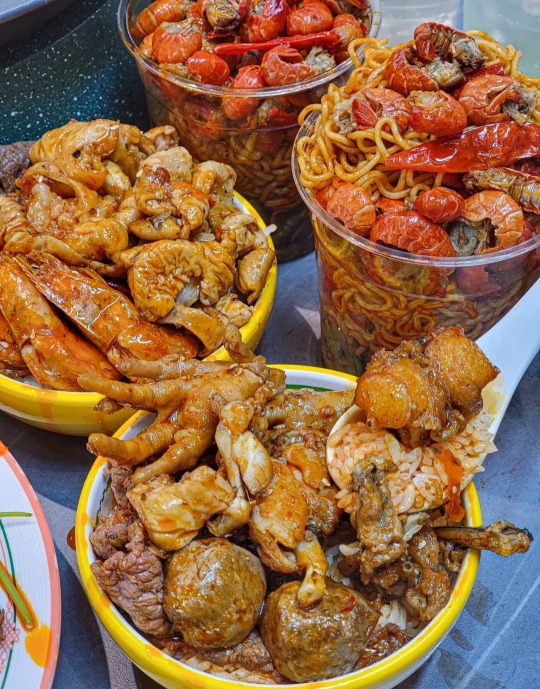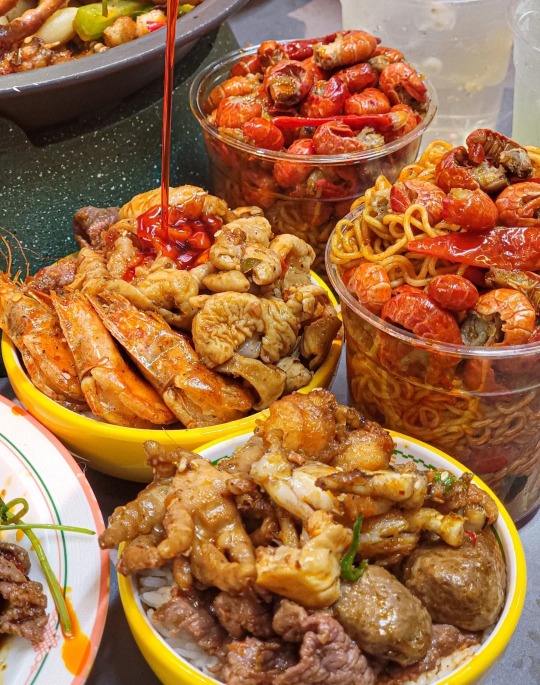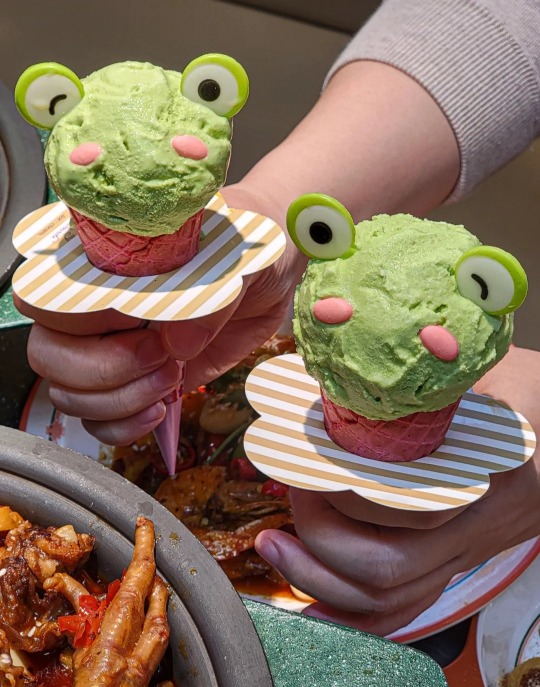#guo xiang
Explore tagged Tumblr posts
Text
Non-action does not mean doing nothing and keeping silent. Let everything be allowed to do what it naturally does, so that its nature will be satisfied.
Zhuangzi
Guo Xiang
12 notes
·
View notes
Text
The Drunk and The Perfected One.
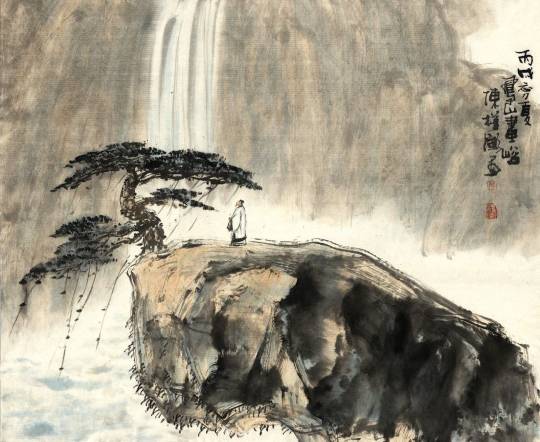
Reading chapter 19 of the Zhuangzi 達生, Understanding Life, we come across a story of a drunk man riding in a carriage, he then proceeds to fall out of the high-moving carriage. However, when he fell out, he was not aware of such an occurrence. He did not fear for his life, nor was concerned with dying. Though he has the same joints and bones as the next person, he does not fear getting hurt. All of this was achieved thanks to the booze.
Now, this is not an excuse to be constantly drunk all the time. The drunk's lack of awareness (being drunk) was brought about by externals; not becoming unselfconscious spontaneously.
Here is the exact quote from Zhuangzi 19.5.1-2:
"When a drunk falls out of a carriage, though it is going fast, he does not die. He has the same bones and joints of others, but when it comes to getting hurt, he is different from them, for his spirit is perfectly whole. He was not even aware he was riding in a carriage, so when he fell out, he was not aware of that either. Alarm for life and death did not enter his breast, which is why such a one could be so at odds with things and yet feel no fear. Since he could achieve such perfect wholeness thanks to drink, how much better could he achieve such perfect wholeness from Heaven?! The Sage hides himself in Heaven, thus no one can harm him."
The one who abides in drink or drugs to achieve this state of "wholeness of spirit" will ultimately fail, once the bottle or baggie runs dry. Yet in those drunken states, they appear very similar to those who abide in Heaven to become whole. The bottle or baggie will always run dry, but Heaven is eternal. The one hiding in the bottle is like the one hiding in Heaven. Because when you get drunk or high, there is no care for the self, body, or life or death. Where they differ is the substance of achieving this notion of discarding the body and distinctions. For the drunk abides in the limited amounts that are contained in their bottle, the Sage abides in Heaven which is boundless, and limitless.
This is the comparison that Master Zhuang is trying to make with the Drunk and The Perfected One. The Drunk and Perfected One achieve similar states of "wholeness" by different means. Though the drunk will become dismembered once the bottle empties, Heaven never runs dry for the Sage or Perfected One. This is why the Perfected One never fails to be Whole, all the time. They abide by a substance that is not a substance. The Sage becomes whole in their extreme sobriety via abstinence and fasting.
The drunk cast away worldly concerns at the cost of his body and mind. The Sage casts away worldly concerns and distinctions by letting go, and letting Heaven take the reigns. Thus, the Sage preserves their material body by discarding the world and its distinctions; and by abiding in Heaven's natural distinctions. In 19.2.1-2, we see this:
"If one wishes to avoid tending to the body, nothing is better than to abandon worldly concerns. Once worldly concerns are abandoned, one is free of entanglements; once free of entanglements, one is true and equitable; once true and equitable, one is reborn therewith; once reborn, one is almost complete. But why is it worthwhile to abandon worldly affairs, and why worthwhile to discard concerns for life? Once one has abandoned worldly affairs, the body is no longer strained; once one has discarded concerns for life, the vital essence is no longer depleted."
All this means that when we abide in Heaven and not the bottle to achieve a wholeness of spirit, we can be reborn or renewed daily. As for why we abandon worldly affairs and distinctions, we do this because they are not Heaven's distinctions, to put it plainly. Master Zhuang says in Chapter 2.14.1 齊物論, "The Dao has no boundaries." Meaning just that, The Dao has no distinctions or things that bind it to one "thing." Later in 2.14.11, Master Zhuang says, "Therefore in such "division" there is a failure to divide; in such "distinction" there is a failure to distinguish."
The drunk achieve their wholeness of spirit by means of initiating the human distinctions, for they are only truly joyful while drunk. The Sage or Perfected One achieves a wholeness of spirit by means of initiating the natural, thus, they invest in life with virtue (19.6.1-3). The drunken one does not abide by their natural principle, and thus, they have to overconsume drink to achieve states similar to the Sage or Perfected One. The Sage abides in nothing of the sort. They abide or hide in Heaven. To "hide" in Heaven means, according to Guo Xiang, "He does not sneak looks out from within his own natural capacity, which is why the text says "hide." The drunk uses conscious knowledge to get drunk and thus achieves a "wholeness of spirit," but this wholeness of spirit is an illusion, and the illusion fades ever away as they sober up. I imagine this character who fell out of this high-moving carriage was pretty sore once he sobered up. Though the Perfected One abides in no such conscious action or knowledge; instead abides unconsciously with Heaven and its natural distinctions, and no such conscious use of knowledge, and thus is never harmed. This is why the Perfected One may maintain such a state of pure Joy as described in the previous chapter of the Zhuangzi, 至樂 Perfect Enjoyment. The Sage, being One with Heaven and Earth and not with human things such as drugs or bottles of booze, can be truly joyful. Which has nothing to do with happiness or sadness, but more on that can be read up here on my Twitter.
So, in conclusion, the point here is that while the Drunk and The Perfected One may appear to achieve similar states of being, one is obviously an illusion brought about by conscious effort and knowledge (The Drunk). While the Perfected One achieves their wholeness of spirit through unconscious effort, wu-wei 無為. The Perfected One abides in the unknowable bounds of Fate and Heaven. And is thus able to not be harmed by anyone or anything.
9 notes
·
View notes
Text

pookie high school artemis and their pookie high school friends <3 jesse on da left and milo on da right. they're nerds and they're all in jazz band. cute!
24 notes
·
View notes
Text








Sooooo... tagging this for the Fangs of Fortune crowd, too, because this will be most likely the next Guo Jingming drama to be released.
Youku currently says 2024, but I don't really believe that. First half of 2025 is more likely. The official English title for this drama will be Hidden Shadow (Chinese: 烽影燃梅香/Fengying Ranmeixiang).
I'm very much looking forward to Li Hongyi in this. He usually plays a very specific type of character (which is stone-cold bitch) and he does it very well. (His character in The Blood of Youth, Xiao Se, is one if my all-time favorite characters. ❤)
I'm also happy to see Yan An again (this time in a completely different role, apparently; my God, he looks so innocent and charming), as well as Ai Mi and Zuo Ye (I hope they won't play star-crossed lovers again 😂) and, of course, Omid. And I'm extremely happy to see Hankiz Omar in this, I just loved her in Ultimate Note. 💜
This will be more of a historical drama, but I'll take anything if I can just see beautiful, unhinged people in incredible costumes again, seasoned with the usual generous pinch of queerness. 😌
#a few thoughts on this drama#烽影燃梅香#Feng Ying Ran Mei Xiang#Hidden Shadow#Guo Jingming#Fangs of Fortune#Li Hongyi#Yan An#Wang Churan#C-drama
20 notes
·
View notes
Photo
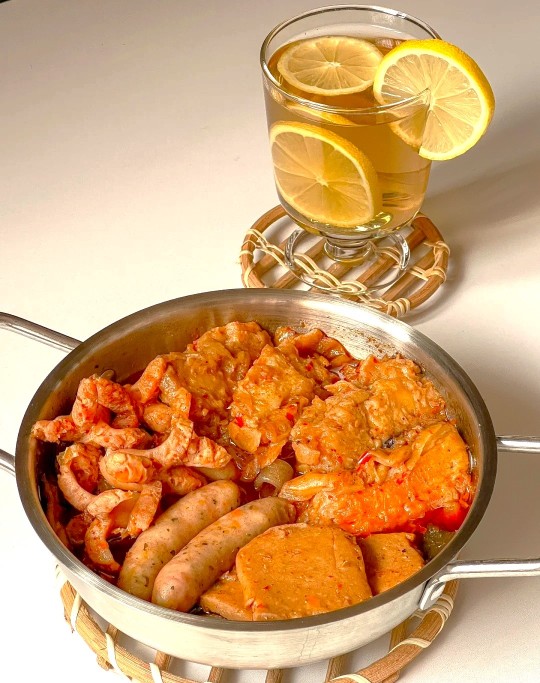
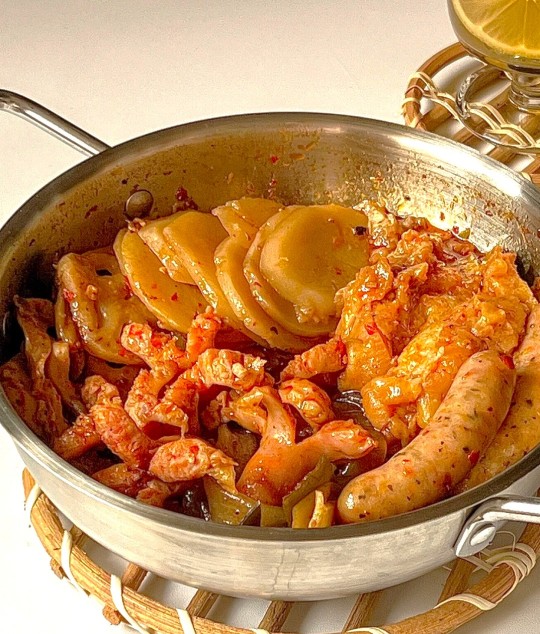
96 notes
·
View notes
Text







#Because Of You#Gabriel makes stuff#Will Chang#Yuan Jun Dao#Leo Guo#Yang Xiang#Yang Xiang x Yuan Jun Dao#Taiwanese Drama#Taiwanese series#Taiwanese BL#Taiwan series#BL Drama#BL series
12 notes
·
View notes
Text
Yep this is messy and I constantly don't know how to color the hair haha I love him
And his name is Long Feng Xiang! Raafa nephewand Mei Ling big brother. And yeah he is the crown prince ehe

#my art#oc#my ocs#digital art#ocs#Feng Xiang#Long Feng Xiang#Long Family#Han Guo Royal Family member
5 notes
·
View notes
Text










Cdrama: Feng Ying Ran Mei Xiang (2024?)
ENGSUB 【BTS】💥杀青特辑奉上!灼灼韶华,举杯邀月诉心志;风禾尽起,策马挥剑决浮云! | 烽影燃梅香 | 王楚然/李宏毅 | 优酷 YOUKU
Watch this video on Youtube: https://www.youtube.com/watch?v=2AFzi-xaOnA
#Feng Ying Ran Mei Xiang#烽影燃梅香#Da Song Nv Ci Ke#Da Song Nu Ci Ke#Wei Song Sha Shou Ri Zhi#Feng Hua Qi You Lu#大宋女刺客#伪宋杀手日志#风华奇友录#風華奇友錄#偽宋殺手日志#2024?#youtube#cdrama#chinese drama#Youku#adelanto#behind the scenes#full cast#Wang Chu Ran#Li Hong Yi#Yan An#Chen Yu Xian#Guo Cheng#Bian Cheng#Omid#Zuo Ye#Jiang Yi Yan
6 notes
·
View notes
Text
Sometimes you just need fried rice from Wok Hey and everything will be OK for a bit.
4 notes
·
View notes
Video
youtube
Chinese Malatang Stir Fry Recipe | Mala Xiang Guo | Chinese Street Food
1 note
·
View note
Text
Why Do We Cultivate Knowledge?
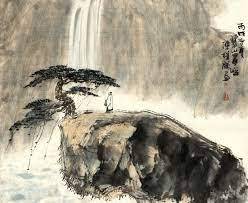
Musing on chapters 14 & 16 of Master Zhuang's Outer Chapters: "The Revolving Heaven天運" & "Mending One's Original Nature or Correcting The Nature 繕性"
[16.1.1] "Once they have mended original nature with conventional wisdom, people now seek to recover its initial state."
This is to mean that when we take in accord with the vulgar "wisdom" of the world and try to use it to alter our innate nature's, we become ever estranged from the Dao.
For most of the Zhuangzi, we see a very anti-epistemological approach. A doing away with the conventional and human distinctions on "what is" and "what isn't," [Zhuangzi 2.14.11-14]. We are told to abandon the pursuit of knowledge [Dao dejing 3]. This is what Master Lao Dan (Laozi) would have Confucius do in chapter 14 天運 "The Revolving of Heaven." Master Zhuang presents us with another dialogue between the illustrious characters where Confucius had been searching high and low for the Dao for 51 years. Yet, he has not yet attained It [14.22]. Lao Dan inquires where Confucius had been seeking The Dao. Confucius says for 5 years he had sought the Dao in astronomical/astrological calculations for 5 years, yet he has still failed to acquire the inarticulate Dao. For 12 years, Confucius sought the Yin and Yang, yet he still has not attained it [14.23-27]. Lao Dan responds wonderfully to Confucius's journey, saying that,
[14.28.1] "Exactly! If the Dao could be presented, who would not present it to his sovereign! If the Dao could be offered, who would not offer it to his parents! If the Dao could be conveyed, who would not convey it to his brothers! If the Dao could be bestowed, who would not bestow it on his sons and grandsons! However, all this is impossible for no other reason than because no master exists within, so it does not linger."
According to Guo Xiang, this means Lao Dan would have Confucius do away entirely with knowledge. Confucius, as he is being presented currently, is looking outward for The Dao, yet he has no master within himself to properly use this knowledge in accord with his natural principle.
Lao Dan says this in 14.28.3-4, "If that which may emerge from within is not received without, the sage does not let it go forth. If that which may enter from without finds no master within, sageness won't abide there." 14.28.3 gives validity to the teacher-student transmission of things. For if no one is there to hear your teaching that arrives spontaneously, in step with Dao and its principles, the teachings do not go forth. And likewise, if we are not present, living radically in the moment while we are (outwardly) learning, true sageness/Dao will not abide within or out of us.
The rest of Confucius and Lao Dan's dialogue concludes that he must do away with those "classics" that I mentioned in my last post. Guo Xiang expands on this, conveying that without us being in accord with our natural principles and finding tranquility from within, everything we learn and know is fodder. It does nothing but estrange us from the speechless Dao. Although the pursuit of knowledge is indeed fulfilling, without us being radically in the moment while we are being presented with "learning" or "knowledge," how can it abide within us and, ergo, fulfill our virtue?
So now we are jumping back to chapter 16. This is quite a curious chapter, meaning it slightly shifts its perspective on knowledge. 16.1.2 tells us, "Having confused their desires with conventional wisdom, they now seek to perfect their understanding through self-conscious thought." This is too mean that we have confused our innate principle with the literal desire to attain knowledge, for knowledge's sake, self-consciously self-reflecting on said knowledge, forever refining our thinking; forever causing us to err. Master Zhuang calls these people the obstructed and obscure [16.1.3]. Guo Xiang expounds on this by suggesting only if we abandon such conventional wisdom and rid ourselves of the desire to attain such wisdom we would be so close to this ineffable Dao.
We must find that "master" within us, as suggested in Chapter 14.28.1, for knowledge to truly benefit us and aid our arsenal to cultivate the Dao. Without it, our nature is lost, and knowledge is thus agitated. This is why in 16.2.1, we are told, "In antiquity those who governed with the Dao cultivated knowledge in tranquility." And again, in 16.2.2, "They knew how to live but were free of knowing how to act with self-conscious purpose, so it may be said of them that they used knowledge to cultivate tranquility." I take this to mean, with the help of Guo Xiang, we just must spontaneously know. Knowledge is something that we must cultivate, there is no question about it. Setting aside religion and philosophy for a second and just using logic, we know that learning and knowledge are fundamental parts of the human experience. We constantly learn daily, whether we are fully aware of it or not. And that, right there, is the point, our awareness of the mass cultivation of knowledge we experience in an ever-globalized world. We are more connected and can access knowledge at the click of a button or a few strokes on a keyboard. Without us being presently aware, living radically in the moment of the knowledge we absorb, the knowledge is agitated, and our natures are obstructed.
Knowledge must nourish our souls and our innate principles. The same is said in reverse, our "master within" or our innate principle must be acted in accordance with the knowledge we receive. This knowledge "used to cultivate tranquility" sounds awfully like gnosis as described in more Western schools of thought, such as Hermeticism. But before we get into that, I must say how important it is to first become tranquil, meaning mastering our inner selves, which could mean becoming more disciplined, doing away with our self-preconceived notions of "this is" and "this is not" and thus, having a complete disregard for knowledge before we embark on any kind of "knowledge" or gnosis. Our tranquility must nourish the knowledge we receive outwardly; likewise, the knowledge we take in must nourish our inner selves.
Okay, enough redundancy. How does this "knowledge used to cultivate tranquility" compare to gnosis? Let's look at Corpus Hermeticum book IV.9: "Thus knowledge is not a beginning of the Good, but it furnishes us the beginning of the Good that will be known... For the Good has neither shape nor outline." Now, Hermeticism is big on "knowledge" or gnosis, which can be defined as the "highest" form of knowledge there is. This knowledge pertains to the Good who is God (The One) and other incorporeal entities such as the gods. It is not something that can be necessarily be "cultivated," in my opinion, but rather experienced. This is not all too different from chapter 16 from Zhuangzi's description of cultivating knowledge to nourish our tranquility and vice-versa [16.2.2]. Gnosis, knowledge, or whatever kind of "learning" is never the beginning of the Good, or of the Dao, but it does indeed furnish us to begin to know the road that leads to the Good, or the Dao.
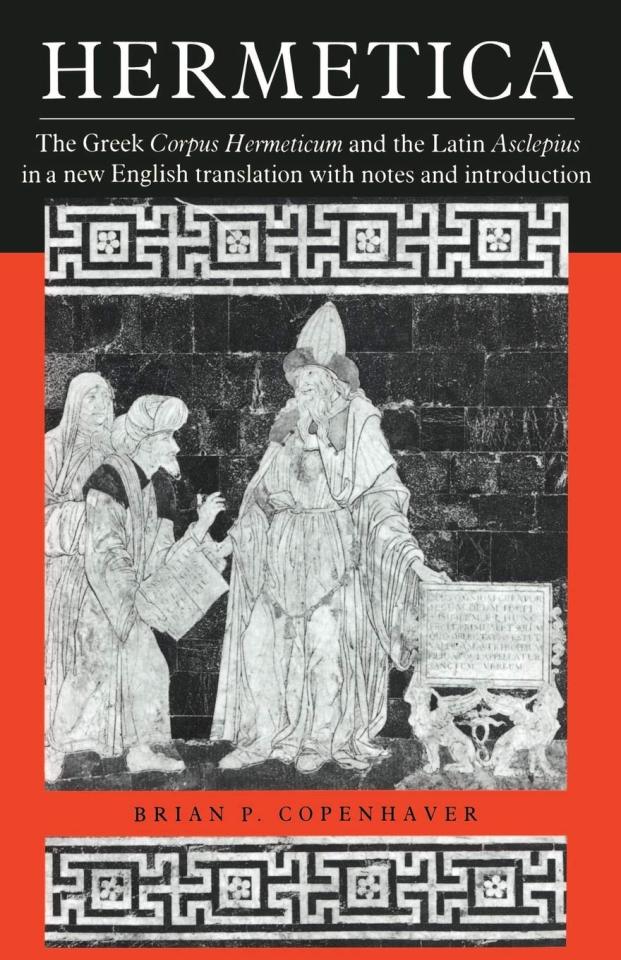
CH IV.11 then tells us, "If your vision of it (The Good) is sharp and you understand it with the eyes of the heart, believe me, child, you shall discover the road that leads above, or rather, the image itself will show you the way. This sentiment rings back in chapter 14 of the Zhuangzi when we discussed finding "the master within" [14.28.3-4]. To "understand it with the eyes of the heart" sounds similar to having a "master exist within."
So to wrap this up, knowledge is okay to cultivate. Knowledge is okay to pursue. Knowledge is something we should strive for. If and only if, we use said knowledge to cultivate our virtue, our tranquility, and our innate principles. We must be in step with our inner selves first and foremost before any pursuit of knowledge or gnosis can have any real, practical effect in our lives. In Hermetic terms, we must use gnosis to furnish our road to The Good which belongs only to the Godhead. Any other knowledge that employs the use of logos, or speech (the conventional wisdom as mentioned above in Zhuangzi 16.1.1), will be fodder in comparison to the gnosis that is experienced and used to furnish our road and the ineffable Good, that is God.
**DISCLAIMER** Any philosophical parallels I draw between Eastern and Western schools of thought are for my own understanding. These parallels, as vague as they might seem, are not to suggest that there is any metaphysical or historical connection or of any historical transmission of ideas between said Eastern (Daoism) and Western schools (Hermeticism). I draw these parallels to remind myself that ideas and philosophical concepts can have similar sentiments, even though the cultivation of each thing (the Dao, and the Good) are gone about in different ways, practice-wise.
#philosophy#daoism#taoism#lao tzu#lao dan#zhuangzi#guo xiang#dao#dao dejing#laozi#corpus hermeticum#hermeticism#hermetic philosophy#hermetica#chinese philosophy
11 notes
·
View notes
Text



some sketches of artemis' friends from when they were younger! i <3 background characters who are never seen
25 notes
·
View notes
Text




#Because Of You#Gabriel makes stuff#Leo Guo#Yang Xiang#Yang Xiang x Yuan Jun Dao#Will Chang#Yuan Jun Dao#Taiwanese Drama#Taiwanese series#Taiwanese BL#Taiwan series#BL Drama#BL series
7 notes
·
View notes
Text
If you ever want to know why I am drawn to cdramas, take a look at these pics for Feng Ying Ran Mei Xiang. Here is Wang Churan, covered enough to please Queen Victoria:

And here is Li Hongyi:
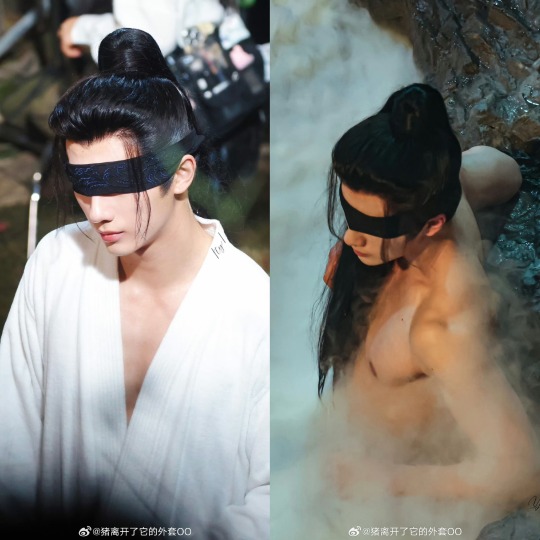
There was clearly only enough material for clothes for one of the leads, and they had to pick.
PS Between the fact that FL is an assassin and ML is her commander/trainer and THAT particular distribution of wardrobe, I believe it surprises nobody that Guo Jingming is listed as one of the two directors.
193 notes
·
View notes
Text
Heart Aflame (3/3) - Zuko x Reader
Word Count: 3 901 Warnings: kidnapping, slavery, human trafficking, colonialism, mentions of: torture, physical violence, death Summary: You learn about a camp where your kidnapped sister might be held, so Zuko and you head out to find her A/N: Part 6.3 of the series Perfect (10 times Zuko thought you were perfect and the first time he told you)
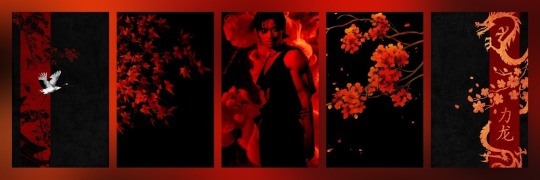
Part One - Part Two
There was the cell you had been looking for. And the door stood wide open.
Your heart, one minute ago still beating wildly, suddenly sank. You were too late.
Nonetheless, you stepped forward to look into the cell. It seemed smaller than the other cells, darker, wetter. And it looked like someone had lived here for a while. A blanket was bunched up in a corner on the cold stone floor, a tray with half eaten porridge stood in the middle of the room, a wooden cup with water had fallen over and spilled across the ground.
Taking a step into the cell, you picked up the blanket. It was still warm. Whoever had been in here had been taken only a few minutes ago.
“They knew we were coming,” you realized, turning to Zuko who stood in the door, his expression clearly displaying his frustration. “How did they know?”
“I have no idea. But we need to find Xiang,” Zuko decided. “Come on.”
Stepping forward, he grabbed your arm and pulled you to your feet. “Maybe they moved her to one of the offices on the second floor. Some of them have special rooms to interrogate prisoners for information.”
And just like that you were running again. The air was burning in your lungs, but you were grateful to be able to move. It helped with the nerves and gave you a little more time to think. How had they known you were coming to find Xiang? Had it just been a coincidence? Xin Yan had said they didn’t know where Xiang was kept. Maybe it was normal for them to move her around. Had it even been her cell you had found? And how was it possible you hadn’t seen them on your way in? Was there another way out of the Mould?
Before you had been able to answer any of the questions for yourself, you had already reached the staircase, and taking two steps at a time, you raced upstairs, back out into the hall and straight into a group of guards.
You stumbled to a halt, making Zuko almost run you over as he came sprinting out of the door right behind you, and you couldn’t help but miss the irony of the situation from before having been reversed. You running into him vs. him running into you. Nobody being where you had expected someone to be there vs. too many people being where you had expected nobody to be.
The guards raised their weapons against you threateningly and without thinking, Zuko pushed you behind his back, summoning his fire.
“I am Prince Zuko, son of Fire Lord Ozai,” he declared, his voice having taken a sinister tone. “You will lay down your weapons or suffer the consequences of disobeying your prince!”
“A banished prince,” one of the guards mocked. “You have no power here!”
A blast of fire hit the guard straight into the chest, making him collapse on the ground.
“Lay down your weapons,” Zuko repeated, his voice nothing like the hesitant, almost shy tone you had gotten used over the few weeks you had spent with him. Instead, it was the voice of a leader, the voice of the fire lord, a voice that tolerated no objection.
The guards started hesitating. That was the difference between a normal military post and this prison school: usually the imprisoned students would probably submit to the threat of violence. But Zuko and you were different. He had received special military training, was a Fire Bender and had spent years of his life fighting real fights like most of the guards had probably never experienced before. You had none of that, but your own life mattered only little when it came to saving your little sister.
A motion behind the guards drew your attention towards it. It was Guo, there was no doubt about it. Had she been the one who had alarmed the guards? Had she recognized you, and made the connection that you were here to break out Xiang? But she wasn’t alone, you suddenly realized. She was dragging something along… someone.
In that moment, the thin, weak voice of a little girl tore through the tense silence.
“Nene!”
It was just two syllables, but that was all it took to tear your heart in two and make you forget everything around you.
Nene, the nickname your sister had always called you. A toddler-version of the local dialect for ‘big sister’. It had been one of her first words, right alongside ‘mama’ and ‘dada’.
She was here. Xiang was right here with you. And she was being held prisoner by the one person who still haunted your nightmares even years after last having seen her.
Not giving the guards or Zuko or anyone else a second thought, you jumped forward, past the spear tips pointed at you and pushed past the guards.
Guo stood in the door to the yard, a wicked, satisfied grin on her bony face as she watched you race towards her. One of her skeleton-like hands was wrapped around Xiang’s little arm, and in the other-
You came to a slithering halt as you recognized the blinking metal in her other hand as a knife.
“Don’t hurt her,” you screamed. Your vision blurred, everything seemed out of focus except for the woman and her weapon in front of you. “Don’t hurt her, please.”
“Did you really think I wouldn’t recognize you,” the old hag sneered. “This brat here-” she shook Xiang, so her small body was thrown around violently, “is just as much trouble as you always were. Did you really think you could just waltz in here and get her back to your barbaric earth kingdom ways?”
“She’s more Fire Nation that you! It’s in her blood,” Xiang spat, her voice brave even though she was being treated so harshly.
Behind your back, Zuko took out the guards, but you didn’t even notice the noise and heat of the fight, only focused on Guo.
“Did you really think, after all the trouble you always caused, I wouldn’t recognize you? I’ll admit, I was uncertain last night, but the sunlight left no doubt, not even in your pathetic disguise as Fire Nation. You’re disgracing the royal colours,” Guo went on. “And the guards: when you were running around down there, didn’t you once question why there were no guards?”
She was right you realized, as heat begun welling up in your stomach. Even though the cells had been filled with students taken prisoner, there had been no guards around. You had been so focused on finding Xiang, that you had ignored all the signs that you were too late. The heat of embarrassment and shame, fear and desperation begun spreading from your stomach down your legs and into your arms.
“You cheated,” Xiang suddenly screamed. “You built the secret passageway and tried to outsmart Nene, but she’s still better than you! She found me and she’s gonna take me home!”
Xiang started struggling against Guo’s harsh grip, but the old woman just yanked her back. The heat that had taken over your body seemed to flow into your hands, making your fingertips tingle almost painfully.
“Stay still or I’ll cut you,” she threatened.
“Don’t hurt her,” you repeated, staring like hypnotized at the way Guo brought the knife closer and closer to Xiang’s skin. Your hands felt like they were aflame.
In hindsight, you weren’t sure what exactly had happened. The moment Guo had moved the knife to Xiang’s arm, you had taken a step forward, reaching out as if you could cross the distance still separating you with the reach of your arm to stop Guo from hurting your little sister. In the same moment it felt like an electrical discharge connected Guo and you in the same way Sokka had described lightning to be created by immense tension between two electrical charges. This was the feeling that raced through your body, accompanied by a feeling of almost relief and the fraction of a second later, a red burning spear made of fire lodged into Guo’s arm.
Her scream echoed back from the tall walls of the hall, and she dropped the knife from her injured hand, letting go of Xiang in favour of clutching the burned stab wound where the spear of fire had disappeared into nothingness.
“Xiang,” you shouted for your sister, who perplexed watched as her tormentor was sinking to her knees, still screaming.
“You’re a Fire Bender,” she wailed accusingly, directing her little bead-like black eyes to you. “You’re a Fire Bender. Traitor! Traitor!”
“Xiang, come on,” you raced forwards, grabbing your sister who was turning to stare at you wide eyed, before snapping back into the moment.
“Behind you!”
One of the guards seemed to have evaded Zuko and was coming straight for you. He was only a few meters away, his sword already up in the air to strike you down, you who was weapon less and defenceless against him. You lifted your hand again, feeling the same relief of the discharge as before and a moment later, a spear of fire bore through the guard’s leg, and he stumbled to the ground.
“Let’s go!”
Zuko came running over, his eyes only scanning over the quickly dissolving spear of fire before he grabbed Xiang, lifting her into his arms effortlessly, and running out into the yard.
You followed him, still feeling the heat in your fingertips. Zuko was running fast, even while carrying Xiang, who helplessly clung onto the young man’s neck. You almost dared hoping you would make it out of the school the way you had gotten in, when suddenly soldiers came swarming into the yard. Not just guards but actual Fire Nation soldiers.
“We need Appa,” you called, catching up with Zuko.
“Not in here. He’ll get captured,” Zuko refused, firing a blast against the soldiers who had closed in from the left. “Let’s take the main gate!”
You changed directions, following Zuko. The soldiers were approaching you fast. They would have caught up with you before you had reached the gate. And even if you made it. The gate was closed. You’d be trapped.
“We’re not gonna make it,” you shouted to Zuko, whose eyes were stubbornly focused on the gate, his expression grim.
“Keep going,” he told you, and you had no choice but to trust him and follow him.
From the right soldiers were catching up to you, and for a third time you allowed the strange sensation of the discharge wash over you, firing not one but several speers in quick succession at your pursuers, who fell back at the threat of getting impaled by fire. A few meters later, you reached the iron wall of the gate. The metal was warm under your hands from the mid-day heat as you pressed your palms against it.
“What now,” you asked as Zuko sat Xiang down.
“I’ll melt the lock; you keep the soldiers in check!”
“How do you want me to do that,” you asked, in a mixture of anger and amused disbelief. You had no weapons, no shield, nothing but the clothes on your body. If it were just your life on the line, you might have been able to think more clearly, but it was also him and Xiang who were depending on you.
“Use your fire!”
The reply came in two voices, the voice of the boy who had already pressed his hands over the lock to melt it, as well as the small, high-pitched voice of your sister.
Not questioning them, you took a protective stance between them and the soldiers who came to a slithering halt when they saw you assume the same pose you had always seen Fire Benders assume in battle. Your heart was beating in your ears and your whole body felt like it had to be bursting into flames.
“No step further,” you warned them, but your warning seemed only to encourage them, as a few began edging forwards.
With a flick of your wrist, you drove a fire spear into the ground in front of one of the soldier’s feet. He gasped out in surprise. For a moment all of them seemed to hesitate, making a feeling of relief spread in your chest. But the relief was only short lived as a second later they all sprung forwards at the same time. This time it was no spear that shot out from your hands, but instead a wide fire blast, erecting a wall of flame between you and your attackers. Behind your fire they were screaming commands at one another, but you couldn’t make out what they were saying over the sound of blood rushing in your ears and the hissing of the flames.
“I got it,” Zuko shouted, grabbing your arm and pulling you backwards.
The moment he touched you, the wall of flames died down, but you had no time to worry about the state of the soldiers, as the gate swung open and Zuko pulled you along with him, having Xiang already lifted into his arms again. The high-pitched whine from Aang Sky Bison whistle sounded in your ears, and hand in hand Zuko and you sprinted down the road you had seen the day prior.
Behind you, the soldiers had already started to pursue you, and even though you had escaped the school, for the first time it felt like you had nowhere to go. If Appa didn’t make it in time, where were you supposed to go? The island was tiny, you’d be caught in no time.
But your thoughts got wiped out by the shadow suddenly covering the sun from above, and a second later Appa touched down on the ground before you.
In one swift motion Zuko all but threw Xiang onto Appa’s back, jumping up with little to no effort as well, before he turned around and offered you his hand. You had barely grabbed it, when he already yelled “Yip yip” and Appa begun floating away from the ground.
Your feet were dangling in the air, but Zuko pulled you into Appa’s saddle with one strong pull, causing you to stumble over the edge and right into him, causing him to fall backwards, with you on top of him.
For a moment, you just lay there and breathed. Sweat was running down your face, your legs hurt from running, your arms and hands felt so sore you could barely move them. The world seemed to be spinning, and black dots were dancing in your vision. But Zuko’s body underneath you was warm and soft. His breaths came in irregular pants and his hand, still closed around yours made you feel safe and comfortable.
It was only a moment later that something heavy and soft plummeted into your side, causing you to roll over and off Zuko. Xiang had launched herself into your side, wrapping her thin little arms around your middle and burying her face in your stomach.
“You came for me,” she cried, her small body shaking with sobs as she pressed closer to you. “Everyone said you were dead, but I knew you’d come and find me.”
Suddenly it felt like you couldn’t breathe. You were still panting from the chase, but your throat closed up and tears sprung to your eyes. For over a year you had dreamt of this moment, of finally holding Xiang again. You had lost count how many times you had seen her die in nightmares, how many times you had pictured getting to see her again, and now she finally was back where she belonged, back with you.
Through tears you looked up to Zuko, who had sat up, leaning against the wall of the saddle. His eyes were soft as he was watching you hold your sister tightly, and you knew that he didn’t need you to say out loud how grateful you were for his help.
-
The flight took several hours, and by the time the sun started setting over the sea, Xiang had told her story to Zuko and you. Trying to offer you some privacy, Zuko had moved to Appa’s head, letting you talk by yourselves, but now, as the sky turned pink and orange, you had asked him to join you back on the saddle. Appa would find the way on his own; he always found Aang without even trying, and you were worried Zuko would fall asleep and fall off Appa. After all, it had been a long journey.
Xiang had calmed down a while ago, clearly exhausted. Now you and Zuko sat opposite one another in the saddle, Xiang cuddled into your side and covered by the jacket Zuko had stolen for himself in the laundry room. (He had insisted on using his jacket as a blanket for Xiang, not wanting you to get cold in the cooling evening air.)
After a while of silence, he eventually spoke up.
“I didn’t know you were a Fire Bender,” he said, closely watching your reaction.
It took you a moment to process his words, before you slowly looked up at him.
“I’m not,” you disagreed.
“You clearly are. You created fire spears and a whole wall of fire back at the school. That was some quite impressive Fire Bending.” Zuko reminded you. “Not something Non-Benders can do.”
“But I’ve never fire bent before,” you shook your head. “I’m not a Fire Bender.”
“Maybe you’ve just never tried,” Zuko offered, “or been in a situation where you needed it. But I’m sure you’d become a great Fire Bender if you were to train a little.”
“I don’t want to become a Fire Bender,” you replied, your answer harsher than he had expected.
Zuko hesitated for a moment before asking: “Why not?”
“All they’ve ever brough my family was pain and suffering. I don’t want to be like them.”
Zuko ignored the painful stab in his chest at your words. But it made sense, he guessed. Your family had been torn apart by Fire Benders. He had been your friend for less than a month. He couldn’t expect his friendship with you to be able to change your perspective on a whole group of Benders overnight.
“Even if your fire had the power to save her,” he asked carefully, nodding towards Xiang. “If you hadn’t used Fire Bending multiple times today, we would be prisoners of the Fire Nation now… or worse.”
You looked down to where your sister was sleeping in your lap, and slowly brought a hand up to her hair, brushing your fingers over it.
“I’m scared of hurting people,” you admitted. “I don’t want to cause pain and suffering, too. I know, I already did today, but…”
“Fire can be more than just a weapon, you know,” Zuko offered. “It can be used for good, too. To light up darkness, to create warmth in the cold. It can even be art. When I was little, we’d have these dancers come to visit the palace sometimes, and they’d dance at night, using their flames to paint patterns and sceneries into the dark. You don’t have to use your fire to fight, but I think it would be better if you learnt how to handle it, otherwise you might end up hurting someone by accident.”
You bit your lip and looked down at your hands.
“Just because I summoned it today, doesn’t mean I’ll be able to do it again tomorrow,” you told him. “I haven’t been using Fire Bending for more than fifteen years, didn’t even know I could. For all we now, it might take me another fifteen years until I can use it again the next time.”
Zuko sighed. “That’s not how bending works. Listen, I’m not trying to talk you into doing something you don’t want to. I really don’t but… The access to your bending is… like a jar of jam.”
Irritated you looked up at him, an amused smile tucking at your lips.
“A jar of jam,” you asked, making him shrug, but he couldn't deny the pride in his chest that he had gotten you to smile.
“Like a jar of strawberry-peach jam,” he agreed. “You know how when you first open a new jar, it’s so hard, almost impossible to open? But once you’ve got it open, no matter how hard you try to screw it shut, it’ll always be way easier than when you first opened it.”
“If my bending runs out as quickly as a jar with strawberry-peach jam, I got nothing to worry about,” you joked, making Zuko sigh.
“That’s not- that’s not what I meant.”
“I know.”
For a while you sat in silence, Zuko keeping a close eye on you, as you were running your hands through Xiang’s hair, detangling her locks. It was awfully obvious that she had been neglected over the past weeks, if not months. Her small body was too thin and light for a child her size and age. Her face, that was supposed to be childishly round, had fallen in cheeks, and dark circles were painted under her eyes. Her hair was matt and matted, her skin pale and littered with scraps and cuts. Whatever they had done to her, Zuko doubted there was a punishment fitting for those responsible. Now Xiang was resting her head in your lap, her small hand curled around the fabric of the Fire Nation uniform you were still wearing, her tiny frame covered by Zuko’s jacket. His eyes wandered from her to you, the way your hands kept busying themselves with her hair or readjusting the jacket around her shoulders as if to make sure she was still with you. Or maybe you were trying to distract you from the fire your hands had summoned just a few hours ago. You looked tired, Zuko thought, but also happy. It had to have been like torture, knowing your sister was out there and being unable to help in the slightest. And now the relief of being reunited with her? Zuko couldn’t imagine how that had to feel. He was just glad he had gotten to help you.
“After the war…” Zuko perked up at your voice. “Promise me we’ll go back there and help these kids find their families again?”
Zuko stared across the small distance, at the way the setting sun was painting your features in warm golden. Did you have any idea how perfect you were? Not just beautiful and sweet, but also courageous, unapologetically gentle and still one of the fiercest fighters he had ever met.
He nodded. “Of course, of course we will.”
You smiled to him and nodded back before closing your eyes and taking a deep breath.
“Thank you,” you whispered over the rushing of the wind. “And Zuko?”
He hummed in reply, signalling he was listening.
“Will you teach me Fire Bending?”
He watched you for a moment, watched how your features seemed to relax. But when he answered with a quiet ‘yes, I will’, a small smile spread over your lips.
Soon the sun had sunken behind the horizon and the stars took over the sky, but Zuko couldn’t be bothered to tear his gaze away from your sleeping form and kept wake all the flight until you had reached Ember Island again.

Tags (it seems like some of the tags aren't working, sorry...):
@ghoststookourlifes
@ashcal99
@4acoffee
@pxrplewalnxt
@toomuchboredd
@banished--prince
@oddobsessionbutotay
@makik0
@joysflower
@hamdehlesmis
@mitski9328373
@angstylittleb1tch
@lovecalll
@sy1v30n
@sagemastah
@buzzbuzzlilbee
@theladyofmanyfandomsofficial
@luvkvni
@atiny-99
@girlkissersco
#perfect zuko x reader#zuko x reader#zuko x you#zuko x y/n#zuko x yn#prince zuko x reader#prince zuko x you#prince zuko x y/n#prince zuko x yn#fire lord zuko x reader#fire lord zuko x you#fire lord zuko x y/n#fire lord zuko x yn#avatar the last airbender x reader#avatar the last airbender x you#avatar the last airbender x y/n#avatar the last airbender x yn#atla x reader#atla x you#atla x y/n#atla x yn#avatar x reader#avatar x you#avatar x y/n#avatar x yn#avatar the last airbender fic#avatar the last airbender fanfic#avatar the last airbender fanfiction#atla fic#atla fanfic
61 notes
·
View notes

